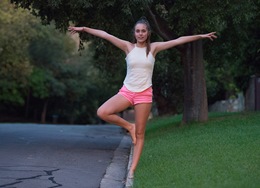15 March 2016
 Increasing research shows that girls lag behind boys in their movement skills, balance and physical activity and that the gender gap only widens as girls get older.
Increasing research shows that girls lag behind boys in their movement skills, balance and physical activity and that the gender gap only widens as girls get older.
A new UniSA research study is seeking to better understand why there is such a gender divide between boys and girls when it comes to movement skills.
Dr Margarita Tsiros, researcher and physiotherapist from UniSA’s Alliance for Research in Exercise, Nutrition and Activity, says that girls may lack some of the basic movement skills and balance needed to be able to participate fully in physical activity.
“There is such a big push at the moment for children to be as physically active as possible, particularly because we know it is so important for maintaining a healthy lifestyle into adulthood,” Dr Tsiros says.
“The problem is that many girls may have limitations in their physical skills – especially when it comes to ball skills, making it more challenging for them to engage in sports for instance.”
Dr Tsiros says reduced balance is another factor that could contribute to any difficulties girls may be having.
“Having good balance and stability is an essential part of being able to perform more complex skills like rolling or kicking a ball, catching, throwing, running and jumping,” she says.
“Interestingly, our prior research shows that girls may be particularly at risk of poor balance and that a range of factors might be important, including body size and activity levels.
“Girls tended to be less active than boys, and they found it more challenging standing on one leg on a balance beam.
“These are interesting findings that we want to explore further, so we can better-design therapy programs to improve balance and movement skills in girls – that way, we can set girls up for success in sport and physical activity and ultimately, better health in the long-term.”
Dr Tsiros is seeking girls of all shapes, sizes and activity levels aged eight to ten years of age to take part in her study.
Eligible girls and their parent would need to attend the University of South Australia for a two-hour visit and will wear a movement sensor for a week. Participants will receive $100 for their time.
For more information, parents can phone (08) 8302 1365 or email sansom.researchvolunteers@unisa.edu.au about the ‘Balance in Girls’ study.
Contact for interview: Margarita Tsiros office (08) 8302 1320 email margarita.tsiros@unisa.edu.au
Media Contact Katrina McLachlan office (08) 8302 0961 mobile 0414 972 537 email Katrina.mclachlan@unisa.edu.au



